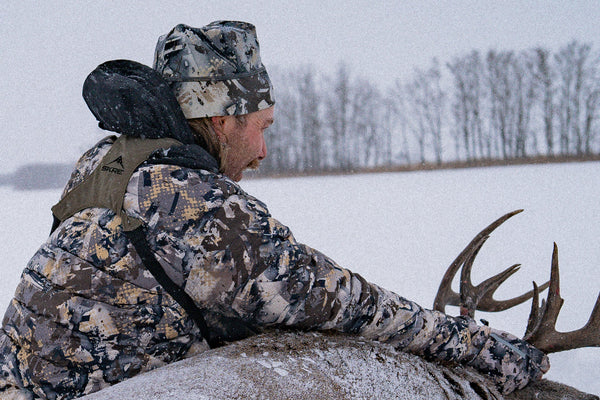The Complete Guide on How to Hunt Whitetail Deer: Tips for Beginners and Experts
Dec 06, 2024
Whitetail deer hunting is one of the most rewarding and challenging pursuits in outdoor sports. Whether you're just starting or a seasoned hunter, mastering how to hunt whitetail deer requires understanding their behavior, using the right gear, and adapting your tactics to the changing seasons.
This comprehensive guide will provide you with actionable tips, from beginner fundamentals to expert strategies, to help you increase your chances of success in the field.
Prepare for Success this Season with a Hunting Pack Tailored for your Needs.
SKRE Gear® has premium hunting packs designed for durability, organization and comfort. Be sure to shop our pack system now to carry all your essentials this season.
Shop Pack System
Understanding Whitetail Deer Behavior
Key Characteristics of Whitetail Deer
Whitetail deer are highly adaptable animals with exceptional senses. They rely on:
- Sight: While they don’t see the same colors humans do, they are adept at detecting movement and contrast.
- Smell: Their sense of smell is one of their greatest defenses, allowing them to detect predators (including humans) from long distances.
- Hearing: Whitetails have excellent hearing, capable of picking up the faintest sounds.
Seasonal Behavior
Understanding seasonal behavior is critical when learning how to hunt whitetail deer:
- Spring and Summer: Deer are focused on feeding and growing, making early mornings and evenings the best times for observation.
- Fall: The rut (breeding season) triggers increased movement and unpredictable behavior in bucks, making it prime hunting time.
- Winter: Whitetails conserve energy, limiting their movements to feeding and bedding areas.
Essential Gear for Whitetail Hunting
Weapons and Ammunition
Choosing the right weapon and ammunition is crucial:
- Bow Hunting: Requires precision and patience; compound bows are popular for their power and accuracy.
- Rifle Hunting: Offers longer range and versatility; calibers like .30-06 or .308 are common choices.
- Muzzleloaders: Provide a unique challenge with their single-shot capability.

Clothing and Camouflage
-
Camouflage: Match your camo pattern to the terrain and season to blend seamlessly with your environment.
-
Layering: Use moisture-wicking base layers and insulated outerwear to adapt to changing temperatures.
-
Footwear: Invest in waterproof boots with good traction for navigating varied terrains.
Must-Have Accessories
-
Optics: Binoculars and rangefinders help you spot and assess deer from a distance.
-
Scent Control Products: Use sprays, soaps, and carbon-lined clothing to minimize human scent.
-
Field Dressing Kit: Includes knives, gloves, and game bags for processing your harvest.
Pre-Hunt Preparation
Scouting and Identifying Hunting Areas

-
Maps and Apps: Use topographical maps and GPS apps to locate trails, feeding zones, and bedding areas.
-
Trail Cameras: Set up cameras near watering holes and feeding areas to track deer movement.
-
Signs of Activity: Look for tracks, rubs on trees, droppings, and scrapes to identify active areas.
Acquiring Permits and Understanding Regulations
- Licenses and Tags: Ensure you have the appropriate hunting license and tags for your state.
- Regulations: Familiarize yourself with local hunting laws, including season dates, bag limits, and weapon restrictions.
Physical and Mental Preparation
- Fitness: Hunting often involves hiking, climbing, and carrying gear, so build your endurance and strength.
- Patience: Whitetail hunting demands long hours of stillness and quiet observation.
Prepare for Success this Season with a Hunting Pack Tailored for your Needs.
SKRE Gear® has premium hunting packs designed for durability, organization and comfort. Be sure to shop our pack system now to carry all your essentials this season.
Shop Pack System
Beginner Tips for Whitetail Hunting
Setting Up Your First Hunt
- Choose a location with visible deer activity.
- Use a tree stand or ground blind to stay concealed and gain a better vantage point.
Understanding the Wind and Scent Control
- Always position yourself downwind of where you expect deer to approach.
- Use scent-eliminating sprays and soaps to reduce human odors.
Taking Your First Shot
- Practice at the range to build confidence with your weapon.
- Aim for the vitals (heart and lungs) for a clean and ethical kill.
Advanced Strategies for Experienced Hunters
Decoding Mature Buck Behavior
-
Older bucks are more cautious and often move at night.
-
Focus on travel corridors and feeding areas during early morning or late evening.

Calling and Rattling Techniques
- Use grunt calls to mimic a buck’s territorial behavior.
- Rattling antlers simulate fighting bucks and can attract dominant males during the rut.
Hunting the Rut
- Bucks are more active during the rut, chasing does and marking territory.
- Use doe estrus scents and calls to draw in rutting bucks.
Post-Hunt Essentials
Field Dressing and Processing
- Use a sharp knife to remove the entrails quickly and efficiently.
- Store the meat in a cool environment to preserve its quality.
Reflecting and Learning
- Analyze your hunt to identify what worked and what didn’t.
- Keep a hunting journal to track deer activity and your progress over time.
Conclusion
Learning how to hunt whitetail deer is a journey of patience, practice, and continuous improvement. By understanding deer behavior, preparing your gear, and adapting your tactics to the season, you can increase your chances of success in the field. Whether you’re a beginner or an expert, the thrill of whitetail hunting lies in the pursuit and the lessons learned along the way.
This guide will help you tackle the challenges of whitetail hunting and enjoy the rewards of the hunt! Visit skregear.com and get stocked up on your whitetail hunting gear today.



